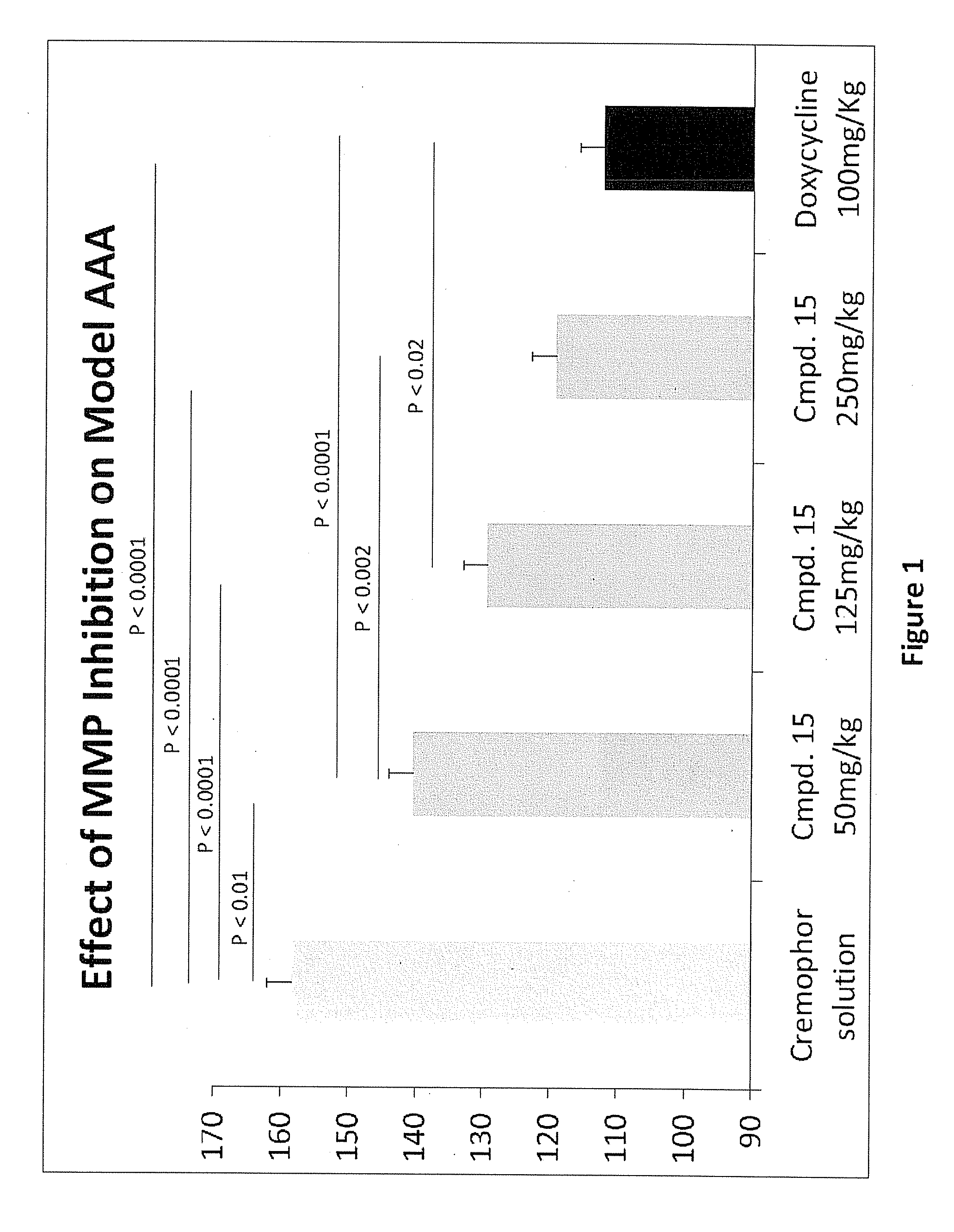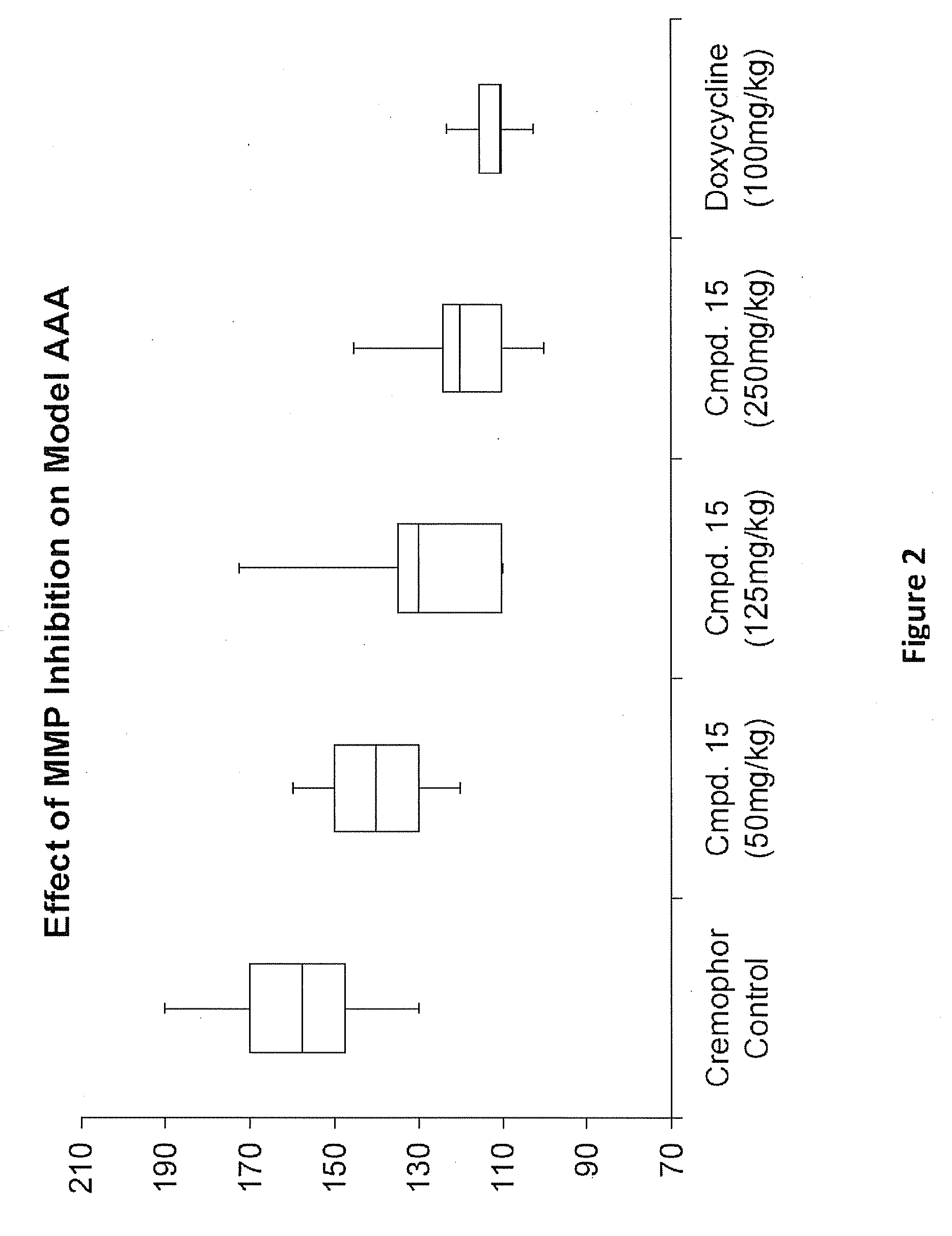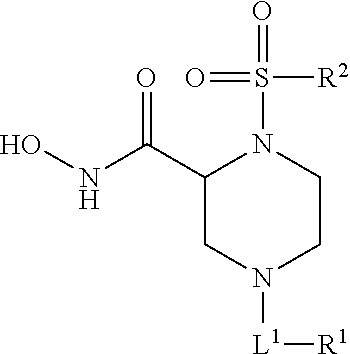Methods of Treating Aneurysmal Dilatation, Blood Vessel Wall Weakness and Specifically Abdominal Aortic and Thoracic Aneurysm Using Matrix Metalloprotease-2 Inhibitors
a technology of matrix metalloprotease and inhibitors, which is applied in the field of methods of treating aneurysmal dilatation, blood vessel wall weakness and specifically abdominal aortic and thoracic aneurysms using matrix metalloprotease2 inhibitors, can solve the problems of hampered clinical trials of broad-spectrum mmp inhibitors, such as marimastat, and severe hemorrhage or other complications, so as to reduce the risk of rupture and little
- Summary
- Abstract
- Description
- Claims
- Application Information
AI Technical Summary
Problems solved by technology
Method used
Image
Examples
example 1
N-Hydroxy-1-[4-(4-fluorophenoxy)-phenyl)]sulfonyl-4-(4-morpholinyl-carbonyl)piperazine-2-(R)-carboxamide (Method A)
Step 1—Formation of 1,4-di-tert-butoxycarbonyl-piperazine-2-(R)-carboxylic acid
[0150]Piperazine-2-(R)-carboxylic acid dihydrochloride (16.6 g, 82 mmol) and dioxane (120 ml) were combined and cooled in an icebath. 5N NaOH (60 ml, 300 mmol) was added, followed by (Boc)2O (41.8 g, 191 mmol). The reaction mixture was allowed to warm to room temperature with stirring over several hours, then concentrated in vacuo. The resulting aqueous mixture was washed with Et2O (3×), cooled in an icebath, acidified to pH 2-3 with concentrated HCl and extracted with EtOAc (3×). Combined EtOAc extractions were washed with water (1×), saturated NaCl (1×), dried (Na2SO4), and concentrated in vacuo to give 1,4-di-tert-butoxycarbonylpiperazine-2-(R)-carboxylic acid as a white solid (27.0 g, 100%). LC / MS Calcd for [M−H]− 329.2, found 329.2.
Step 2—Formation of methyl 1,4-di-tert-butoxycarbonyl pi...
example 2
N-Hydroxy-1-[4-(4-fluorophenoxy)-3,5-difluorophenyl)]sulfonyl-4-(ethoxycarbonyl)piperazine-2-(R)-carboxamide (Method B)
Step 1—Formation of 1-[4-(4-fluorophenoxy)-3,5-difluoro-phenyl)]sulfonyl-4-boc-piperazine-2-(R)-carboxylic acid
[0155]4-Boc-piperazine-2-(R)-carboxylic acid (933 mg, 4.05 mmol), CH2Cl2 (12 ml), DMF (6 ml), and DIEA (2.5 ml, 14.3 mmol) were combined under N2. TMS-Cl (810 μl, 6.38 mmol) was added slowly and the mixture stirred at room temperature for approximately 2 hrs. 4-(4-fluorophenoxy)-3,5-difluorophenyl)]sulfonyl chloride (1.43 g, 4.43 mmol) dissolved in a minimum of CH2Cl2 was added and the mixture stirred at room temperature for another 2 hrs. The reaction mixture was diluted with EtOAc and washed with 0.5N HCl (3×), sat'd NaCl (1×), dried (Na2SO4), and concentrated in vacuo. The resulting crude oil was purified by flash chromatography (6:4 hexanes:EtOAc+1% AcOH) to give the desired product (1.37 g, 65%). LC / MS Calcd for [M+H]+ 517.1, found 417.0 (-Boc).
Step 2—...
example 3
N-Hydroxy-1-[4-(4-cyanophenoxy)-3-fluorophenyl)]sulfonyl-4-(2-methoxy-1-ethoxycarbonyl)piperazine-2-(R)-carboxamide
(Method C)
Step 1—Formation of 1-[4-(4-cyanophenoxy)-3-fluorophenyl)]sulfonyl-4-boc-piperazine-2-(R)-carboxylic acid
[0160]Piperazine-2-(R)-carboxylic acid dihydrochloride (1.25 g, 6.1 mmol), dioxane (15 mls) and water (6.0 mls) were combined and cooled in an icebath. 9N NaOH (2.0 mls, 18 mmol) was added slowly with stirring, followed by (Boc)2O (1.35 g, 6.2 mmol). The reaction mixture was allowed to warm to room temperature and stirred for an additional 3-4 hrs. Et3N (1.8 mls, 13 mmol) was added, followed by 4-cyanophenoxy-3-fluorophenylsulfonyl chloride (2.00 g, 6.4 mmol). The reaction mixture is stirred at room temperature for 1-2 hrs, then concentrated in vacuo. The resulting residue was partitioned between 1.0N HCl and EtOAc. Phases were separated and the aqueous phase was further extracted with EtOAc (2×). Combined EtOAc extractions were washed with 1.0N HCl (1×), s...
PUM
| Property | Measurement | Unit |
|---|---|---|
| temperature | aaaaa | aaaaa |
| strength | aaaaa | aaaaa |
| elasticity | aaaaa | aaaaa |
Abstract
Description
Claims
Application Information
 Login to View More
Login to View More - R&D
- Intellectual Property
- Life Sciences
- Materials
- Tech Scout
- Unparalleled Data Quality
- Higher Quality Content
- 60% Fewer Hallucinations
Browse by: Latest US Patents, China's latest patents, Technical Efficacy Thesaurus, Application Domain, Technology Topic, Popular Technical Reports.
© 2025 PatSnap. All rights reserved.Legal|Privacy policy|Modern Slavery Act Transparency Statement|Sitemap|About US| Contact US: help@patsnap.com



